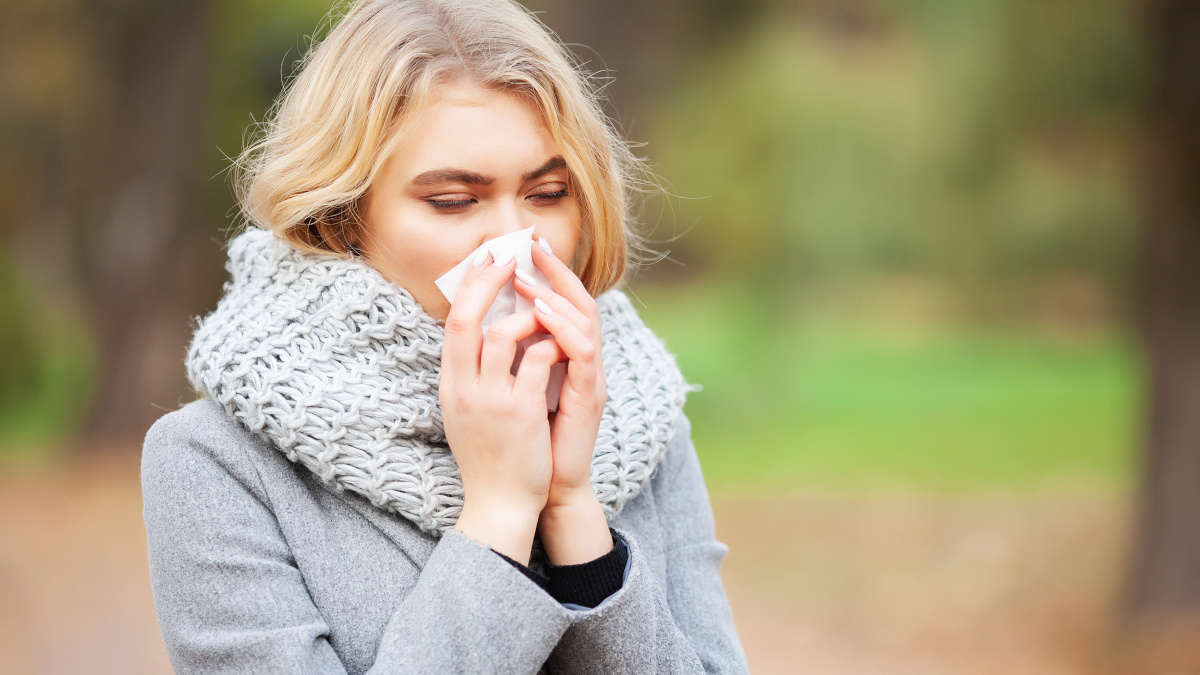
Catching a cold: let’s put paid to a common misconception
We’ve all experienced the unpleasant feeling that comes from staying out in the cold too long ... the body starts to shiver (as muscles automatically contract to generate heat), the nose starts to run (as more mucus is produced to protect the nasal mucous membranes from the cold air)...
But despite these natural responses by the body to a drop in temperature, exposure to the cold in itself does not directly cause winter ailments! For that, we need to have caught … a virus (or some other pathogen).
Thus the oft-repeated warning that if you get cold, you’ll ‘catch cold’ is unfounded. What is true, however, is that we suffer more ailments in winter than we do in summer (1). So why is this?
Why are we more often ill in winter?
Doctors and epidemiologists have identified a number of key factors that predispose to winter ailments:
Being cooped up indoors
In winter, the cold weather means we go out less – we tend to stay inside in spaces with little or no ventilation. As a result, the slightest virus gets easily transmitted between individuals.
What’s more, staying inside means seeing less of the sun. And our overall lack of exposure to the sun’s rays in winter, particularly UVB (as explained in this article on vitamin D) already results in us having lower concentrations of vitamin D, a vitamin which supports healthy immune system function. A lack of sun exposure and lower vitamin D levels means a less effective immune system (2).
Drier air
In summer, the warm, humid air creates condensation which weighs down virus droplets, forcing them downwards. In the winter, when the air is drier, viruses are lighter and more volatile and are therefore more likely to reach mucous membranes and enter the body.
The cold does still play a role
While it cannot in itself cause illness, cold winter weather does have a negative effect on the body:
- by promoting vasoconstriction, the cold slightly slows down our immune response;
- but in particular, in order to warm up the air entering the lungs, our noses produce a lot of mucus causing a runny nose, which dries out the airways. As a result, our mucous membranes are less well-protected and a little more vulnerable to attack.
Most significantly, the cold enables viruses to remain infectious for hours and hours. The colder it gets, the greater a virus’s protection and the more resistant it becomes.
Useful health tips for winter
There are simple steps you can take to help you avoid catching a winter cold and falling ill:
- employ what are now familiar physical barrier measures, namely: keep your indoor environment well-ventilated, cough into your elbow, wash your hands regularly, and wear a mask indoors if necessary, etc.;
- wrap up well (especially your head, hands and feet) when out in the cold to prevent vasoconstriction which, as mentioned, has a mildly adverse effect on the body’s immune response. Remaining too long in icy temperatures without adequate protection can obviously also induce a state of hypothermia (where body temperature falls to below 35° C which can actually be life-threatening, even though it does not constitute a winter ailment);
- and don’t smoke to avoid weakening the airways, drying out the mucous membranes and damaging the immune system.
While we’re not pretending it will protect you 100% from viruses, increasing your vitality and boosting your immune system can help you escape winter fatigue and improve your resistance to external aggressors.
Diet is and will always be one of the most important elements here. In winter, we tend to opt for high-fat, high-sugar, comfort food, eschewing crudités and salads. Yet excess consumption of fats and sugars can be detrimental to health, while vegetables provide vitamins, especially vitamin C which is essential for our immune defenses.
Substances good for immunity
Zinc
Zinc is a trace-element essential for health which is involved in many physiological processes, especially in the muscles, bones, skin and liver. And most importantly, zinc supports normal immune function by increasing B and T lymphocyte activity (4).
Zinc is normally obtained from the diet (sources include oysters, calves liver or beef liver, braised beef, lamb, and crab). However, some people may be deficient, either because of poor absorption (in the case of digestive problems), or a diet low in specific animal proteins.
In such cases, it can help to take a zinc supplement in winter (they are available as suckable sweets such as Advanced Zinc Lozenges).
Echinacea
A perennial plant from the same family as asters, thistles, dandelions, cornflowers and daisies, echinacea is a medicinal plant from North America, used for thousands of years by native Americans.
Containing alkylamides and polysaccharides, echinacea root is thought to work by increasing phagocytosis. The plant is known for supporting the body’s defense systems as well as for soothing a sore throat (3).
Echinacea should ideally be taken in conjunction with other vitamins and minerals that support immunity, such as vitamin C and zinc (all these compounds feature in Immunity Booster, for example).
Ginseng
An ancient plant long used in Ayurvedic medicine, ginseng is an Asian perennial, the root of which has a wide range of applications: in phytotherapy, ginseng is referred to as an adaptogen plant.
Recent studies have shown that its most important active ingredients, ginsenosides from the saponin family, help to support the immune system and maintain vitality (5).
Ginseng (particularly in a formulation standardized to 30% ginsenosides, such as Ginseng 30%) is therefore an excellent supplement to take in winter.
Reishi
Used for thousands of years in traditional Chinese and Japanese medicine, reishi is a very popular mushroom, particularly following the successful development of its cultivation.
Recent research has demonstrated that the high content of specific polysaccharides called beta-glucans found in reishi as well as in many other Asian mushrooms may activate certain immunity-related genes (6-7).
To get the most out of the benefits of reishi and other mushrooms, you could opt for a synergistic formulation that combines several organic mushroom extracts: reishi, shiitake, chaga, cordyceps, etc. (such as the supplement Organic MycoComplex).
References
- https://www.santepubliquefrance.fr/determinants-de-sante/virus-hivernaux
- Vitamine D : métabolisme, régulation et maladies associées, Emilie Tissandié, Yann Guéguen, Jean-Marc A. Lobaccaro, Jocelyne Aigueperse, Maâmar Souidi, MEDECINE/SCIENCES 2006 ; 22 : 1095-100
- BANY, J., SIWICKI, A. K., ZDANOWSKA, D., et al.Echinacea purpurea stimulates cellular immunity and anti-bacterial defence independently of the strain of mice. Polish journal of veterinary sciences, 2003, vol. 6, no 3 Suppl, p. 3-5.
- BONAVENTURA, Paola, BENEDETTI, Giulia, ALBARÈDE, Francis, et al.Zinc and its role in immunity and inflammation. Autoimmunity reviews, 2015, vol. 14, no 4, p. 277-285.
- KANG, Soowon et MIN, Hyeyoung. Ginseng, the'immunity boost': the effects of Panax ginseng on immune system. Journal of ginseng research, 2012, vol. 36, no 4, p. 354.
- KUO, Mei-Chun, WENG, Ching-Yi, HA, Choi-Lan, et al.Ganoderma lucidum mycelia enhance innate immunity by activating NF-κB. Journal of ethnopharmacology, 2006, vol. 103, no 2, p. 217-222.
- https://cordis.europa.eu/article/id/150431-dietary-fibres-to-boost-the-immune-system/fr
3
Fast service good products
Fast service good products
PERCY
1 Days
Great Product ...........
Great Product ............ Fast Service. Thanks Supersmart.
SCOTT Mark
1 Days
Good price & waiting to find out how beneficial the product is.
At this time I can not comment on any medical value of my purchase. I have no medical issues I'm treating so I will have to wait until my next blood test some months away to see just what benefit this product has given me.
El Capt
1 Days
Quality Products
Fast shipping and quality supplements - some that are hard to find. Great selection on the website and usually have discounts.
WadeS
5 Days
Customer service is impeccable
Customer service is impeccable, shipping is almost immediate and best of all quality of products are second to non!
Mohamad Hussein
5 Days
Great fast service.
Great fast service.
Wai Kuen Lee
7 Days
Good service, fast delivery.
I received my order in just a few days. Great service, considering it was sent via USPS!
ABERT Ronald
7 Days
Great quality I noticed the vitamin B1…
Great quality I noticed the vitamin B1 and the Magnesium Complex helps my nerves and helps me go to the bathroom easier
MMA TUBE
9 Days
I'm so glad I found this site!
The ordering experience was a breeze. My choice in the products were mainly of their description which fit very close to what I was looking for. Since I have been using the supplements for a few months now, there is a big difference in the way I feel. I am much more focus. Thank you for providing good quality products that works!
Honyee
11 Days
Very effective high-quality
These are very effective high-quality products. I can feel the difference.
Julee
11 Days
Arrived on time
My product arrived on time and was packaged professionally.
LAURIE CALLAHAN
11 Days
The best
Outstanding products and service
jaygol
12 Days
Best products around
I really love the products here they’re good quality and they work great customer services. Awesome. I highly recommend these products that they have online.
James Freeland
14 Days
Good
My experience was good and I am happy.
LEE Greg
15 Days
The site is easy to navigate and I can…
The site is easy to navigate and I can find everything I need in just a few clicks. On top of it, I trust the formulations and high quality of everything SuperSmart offers.
Oliver Vanacore



